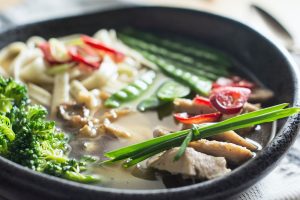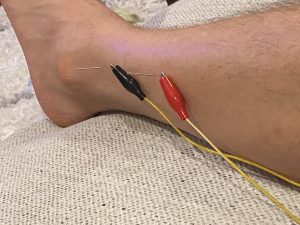Acupuncture
3 Tips for Winter Self-Care
 With the shorter days and longer, colder nights of winter upon us, it is in our best interest to follow nature to best support well-being. Of course, to some degree it is relatively impossible for most of us to alter most things about our lifestyle based on the seasons. Modern society does not follow, nor concern itself with the Tao. The Tao does not make money nor promise love, and even if it could we are not learned enough in it to follow with much accuracy. Nevertheless, we can still do what we can when we can, make minor modifications, certain mindful choices whenever possible, as I would be remiss to not share.
With the shorter days and longer, colder nights of winter upon us, it is in our best interest to follow nature to best support well-being. Of course, to some degree it is relatively impossible for most of us to alter most things about our lifestyle based on the seasons. Modern society does not follow, nor concern itself with the Tao. The Tao does not make money nor promise love, and even if it could we are not learned enough in it to follow with much accuracy. Nevertheless, we can still do what we can when we can, make minor modifications, certain mindful choices whenever possible, as I would be remiss to not share.
- Stay warm… but not too warm! While Chinese Medicine is all about warmth, encouraging vasodilation over constriction, if you live in a climate that has the four seasons it does not benefit your “wei qi” (immune system) to never experience the conditions and elements at all. This does not mean go out wearing belly t-shirts, short sleeves, or no socks at the first weather report above 40 degrees. On the contrary, hats and scarves are highly recommended, as is not being overly sedentary or sheltered. A sheltered existence, whether literally or figuratively, creates a weaker shell. For our purposes we might think of our immune system as our shell. Even if just for a commute or walk around the neighborhood, it is important to get outside on most days, bundle up, and not fall too victim to the privilege of modern climate control.
- Sleep earlier. While the recommended bedtime in Summer is 11pm, in Winter it is 10pm. This doesn’t mean get into bed at 10pm, watch a movie until 12, and fall asleep around 12:20. It means to be unconscious at 10:00. For those of us this presents a challenge for, the earlier you can do the better. There is a biomedical belief that for healthy sleep habits, consistency of bedtimes is most important. If one goes to sleep at 1am a few nights out of the week, one should do so every night. From a Chinese Medical perspective, this is a bit like recommending if you eat pizza once a week you should do so daily, so that it is never able to shock your microbiome. Instead, we recommend making the healthiest possible choice as often as possible. Also, don’t eat pizza every week. I love pizza too, but let’s be honest. It’s fast food.
- More (red) meat), less raw food. I know it feels like Chinese Medicine doctors are always trying to get people to eat more red meat and less raw food, but that really is not the case. The summer is a time for both raw foods and red meat in moderation. There can be more days of veganism or pescatarianism in Summer, as excessive beef is too warm for most bodies on hot days. By contrast, Winter is the coldest, most yin time of year. It is the time to protect our bodies’ “yang qi,” or metabolic fire, as we observe in so many other animals as a time to store fat (you can begin your South Beach diet in April). The oppressive cold of yin requires balance in the form of yang-warming ingredients—think steak cooked with garlic, onions, or ginger. If you cannot consume red meat it is advisable to accentuate the warming spices. Please note, this does not mean hot sauce or red pepper, which is a bit to healthy spices what coffee is to much needed rest. It will give a temporary surge of warmth, but in the long run will dry out the healthy stomach fluids, which will make it more difficult to absorb nutrients and generate natural yang inside the body. Spicy food is not “yang,” any more than yelling or shouting is “strong.”
For my part what I can offer for the next few months is more moxibustion, heat lamps, and heated tables when indicated. Burning the mugwort herb on acupuncture points generates healthy warmth and organ fluids in a way that no other modality can, in my opinion. In biomedical terms, it reduces cartilage damage from inflammation by modulating the NF-κB signaling pathway. It also drops pain via the suppression of Cox-2, which is an inductible enzyme that is highly expressed with pain. Recall, one of the oldest Chinese Medicine maxims: Where there is pain there is stagnation. Where there is stagnation there is cold. This is why my office smells like an incense store in winter.
Acupuncture for Treating Leaky Gut Syndrome

There are a variety of gastrointestinal and autoimmune diseases that can contribute to what is known as leaky gut syndrome. So, what exactly is leaky gut syndrome? It’s close to exactly what it sounds like. Each one of us has semi-permeable guts. What that means is the mucous lining of our intestines is designed to absorb water and nutrients from our food. Your intestinal lining is responsible for acting as a barrier to bacteria. With leaky gut syndrome, your intestinal lining “leaks” allowing more water and nutrients through, but also potentially allowing toxic molecules to come through as well. continue reading
The 12 Meridians of the Body Explained

The meridian system is a phrase that comes up often during acupuncture treatment. Traditional Chinese medicine believes that energy (also referred to as qi) flows throughout the body much like blood does. When this flow of energy becomes disrupted, symptoms and disease can occur. Acupuncture and other forms of Eastern medicine work to restore the flow of energy throughout the body using the meridian system. continue reading
Sprained Ankle Remedy: The Follow-Up
I want to begin this week’s newsletter by clarifying and/or elaborating on the previous. This is just part of the reason I appreciate and enjoy replies and feedback. The latter as it serves keep in touch with old friends—the former as it gives me the opportunity to improve my communication in educating people about Chinese Medicine.

Several people responded to my miraculous sprained ankle healing story with inquiries to whether they could or should use the same topical for their own chronic pain; which told me I fell a bit short in my explanation.
The external application I used for my acute injury, San Huang San, contains herbs that are very blood-invigorating, which can be good for most forms of pain, but also very COLD, which is only advisable in the very first stage of an acute injury. Past that interim, San Huang San would most likely do more harm than good (just like ice), as in contrast to allopathic medicine we offer no one-size-fits-all remedy for a particular symptom, i.e. Pain/Inflammation.
The same principle applies to internal medicine, as people have come into the clinic asking for “the herb for weight loss,” or “the herb for high blood pressure.” There is no such thing, and if an acupuncturist ever tells you or prescribes otherwise, run. From our perspective, either of these pathologies can be a result of different dysfunctions in different organ systems within each person. While in one case we may have to strengthen the lungs’ circulatory function and remove fluid retention from the urogenital microbiome, in another we might have to remove fluid from the gastrointestinal microbiome and sedate pulmonary function. Very different diagnoses and prescriptions.
For chronic pain the best things people can do, in my opinion, are yoga, qi gong, or pilates. Without a daily, or at minimum weekly routine, I can’t imagine how it is humanly possible to live without pain or discomfort. Topically, what I am presently using in the clinic and seeing best results with is a more warming analgesic liniment, nicknamed “Evil Bone Water”—bottles available upon request at my office.
As the weather in the northeast has suddenly shifted from very warm to cold and pouring rain it is common for people to be more vulnerable to viruses or exacerbations of musculoskeletal pain. The warm weather opens our pores and dilates our blood vessels, and we wake up the next morning and must go outside into the cold rain, which has greater opportunity to “enter” and exacerbate pre-exiting “dampness” at the neuromuscular or immunological layers.
This is why during this time of year it is especially important to dress relatively warm (I can’t tell you how many girls I’ve seen in cutoff belly shirts and guys I’ve seen outside jogging topless, both of which just begging for pathological dampness!), avoid raw foods, and eat ginger, garlic, and onions. This past weekend of torrential downpour we made a chicken soup cooked in chicken bone broth, with the typical accoutrement, chopped celery, carrots, potato, onion, garlic, and ginger, with quinoa cooked separately so as to add to the many leftover portions to come. Rice or noodles are a fine substitution here, but as we consume plenty of both in our home, I like to occasionally honor the western nutritional perspective as well.
I hope everyone is now a bit clearer on what San Huang San is, why it worked so well for me, but likely would not for you presently. However, there are other options for chronic pain, such as the now widely renowned in my world, “Evil Bone Water,” as well as the always advisable diet and exercise. Wishing everyone a pain and virus free week, in spite of this proverbial cold, wet rag that temporarily surrounds us.
Healing my Acute Ankle Sprain Overnight!
 Every once in a while I am reminded, by way of my own personal suffering, of the incredible power of our medicine when we “nail it,” usually thanks to the healing hands of others, but sometimes even by “representing myself in court.”
Every once in a while I am reminded, by way of my own personal suffering, of the incredible power of our medicine when we “nail it,” usually thanks to the healing hands of others, but sometimes even by “representing myself in court.”
Thursday mornings are generally the most challenging at home. I have to leave a bit earlier to get to the school downtown and teach, which means I have to prepare breakfast and the baby’s things a bit faster, and often times endure her expressions of raging heartbreak when I must break out of the house shortly after she wakes up. Last week was one such morning.
As Jillian scrambled to get ready upstairs and I to prepare to leave downstairs, Peyton found herself in a “Daddy mode,” wanting me and only me, as my wife attempted to dress and brush teeth in hyper-speed so as to not leave our very mobile, curious toddler alone downstairs. Finally, it was 7:55, my hard out. I picked up the baby, carried her upstairs in hysterics, kissed her, set her down in front of my flustered wife, scrambled down the steps, and WHAM! Rolled my left ankle inward and exclaimed in pain in lieu of shouting “I love you,” on my way out.
I’d gotten lucky. On my walk to the train I realized the sprain or strain, or whatever had just happened must have been mild, as I felt only a mild twinge of pain at the ankle. I figured this should be a quick fix while watching TV later that evening.
But over the course of the day, I observed the pain grow gradually worse, and it wasn’t because I was standing or pounding on it excessively. To the contrary, supervising student clinic shifts is mostly sedentary and physically undemanding. By the end of the shift I was truly limping, to the point that it was difficult to get down the subway steps. By the time I got off the subway it was difficult to drag myself through the tunnel at Penn Station, requiring manual use of a wall to support my limp. And by the time I got off New Jersey Transit a half hour later I was in pain even at rest and could not apply any pressure to the foot whatsoever. In all of my youthful years skateboarding and playing soccer this was easily the worst sprain I’d ever had. I hopped down the stairs one step at a time and needed a ride home from the station.
As most of you know, I am a big believer that painkillers of any form should be relegated for pain—not discomfort—as my opinion is the laissez faire way in which they are ingested likely contributes over time to malabsorption in the gut, which is a primary etiology for many diseases. However, they do have their place, and this was one of them. With both sides of my ankle now throbbing, even while elevated on the couch, I ate some soup and took the max dosage of ibuprofen. From there the pain subsided and I returned to Chinese Medicine.
San Huang San is an empirical treatment for the first stage of such injuries. Nicknamed “herbal ice,” it reduces inflammation even more powerfully, but instead of constricting local blood circulation it enhances it, and I desperately wish all professional athletes knew about this ancient cure. I hopped into the kitchen, cracked an egg into a bowl, removed the yolk, and poured the herbal powder in with the white part to make a poultice. Stirring, stirring, stirring furiously, while my ankle pounded, pounded, pounded furiously with pain, I was determined to get back to the couch and begin this healing process as soon as possible.

Step 1: Bleed the “jing wells.” Jing well points are the first on each meridian, which means ends of the fingers and toes. It’s not always the most pleasurable experience, but pricking these points with a lancet to drain stagnated blood along the channel of physical trauma is a great way to begin the anti-inflammatory process by making space for new blood to come in. It’s a bit psychologically challenging to do on one’s self, but I managed, on the ends of both the big and fourth toes.
Next I used a spoon to apply my brown pasty, egg-white-based poultice to the entire ankle and wrapped it all up with bandages from our medicine cabinet. When the ibuprofen kicked in, I was no longer in pain at rest, but still was unable to put any weight whatsoever on the foot. That night I chose to sleep on the couch downstairs, as opposed to thunderously hopping up the steps and surely waking the baby.
Before bed I did acupuncture: Two points along the posterior tibial nerve pathway that innervates the medial malleolus (inner ankle), and two points along the peroneal longus and brevis respectively, which innervate the lateral malleolus (outer ankle). 15 minutes on each side, a protocol I was about to great practice in performing in the week to come.
I canceled my entire workday on Friday (sorry everyone), just praying that things would be manageable by Monday. When I woke up the next morning I was not in pain at rest, which meant I could put the Advil away for now. Before choosing to hop to the bathroom I thought I’d give a very light limp a try. I braced myself by my arm up against the living room wall and put the gentlest pressure I could muster onto the floor. No real pain. “Heyyy, that’s at least some improvement!” I took another step, this time cautiously applying even more pressure, and again noticed zero to minimal pain.
In my 20 years as a patient of Chinese Medicine, that walk from the couch to the bathroom was one of the most awe-inspiring, amazed experiences I’d ever had. With every step I applied more pressure and with every step I felt more gratitude and disbelief. I knew the reputation of San Huang San powder. I’ve used it on patients as well as on myself before, but I’d never seen it work at this speed with this degree of efficacy. My ankle was 80-90% better literally overnight. I almost thought twice about calling my patients to reschedule the afternoon, but with the help of a more level head from my better half I thought better of it and took the day to rest. Instead, and to satiate my Type A workaholism I purchased an online webinar by one of my mentors and spent the day studying. I am now one week removed from the sprain and feel 100% better.
Most people are aware of Chinese Medicine’s efficacy at treating chronic pain and injuries, but don’t realize that many such protocols, powders, formulas, and treatments were created and developed to treat injured soldiers in the ancient times of China’s warring states. Instead of the western RICE method, which even its creator, Dr. Gabe Mirkin, has conceded as wrong, please don’t hesitate to reach out the next time you sprain an ankle, break a bone, or tear a ligament. Like the smartphone saying, “There’s an app for that,” in Chinese Medicine we might echo, “There’s a treatment for that.”

